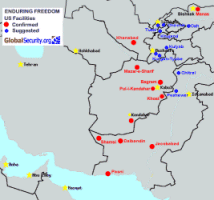Uzbekistan Facilities
 The United States is in negotiations to open a new military base in southern Uzbekistan that would bring $1 billion to the Uzbek budget annually, uzmetronom.com reported 30 July 2014. “According to experts familiar with the situation, the main goal of a high-ranking American visitor, with the ranking of general, is to attain Uzbekistan’s consent to deploy an American contingent and military equipment, including aviation, in the Uzbek city of Termez, which is just across the Amu Darya River from Afghanistan,” the online newspaper reported commenting on the visit of the commander of the US Central Command Army, General Lloyd Austin, to Uzbekistan.
The United States is in negotiations to open a new military base in southern Uzbekistan that would bring $1 billion to the Uzbek budget annually, uzmetronom.com reported 30 July 2014. “According to experts familiar with the situation, the main goal of a high-ranking American visitor, with the ranking of general, is to attain Uzbekistan’s consent to deploy an American contingent and military equipment, including aviation, in the Uzbek city of Termez, which is just across the Amu Darya River from Afghanistan,” the online newspaper reported commenting on the visit of the commander of the US Central Command Army, General Lloyd Austin, to Uzbekistan.
The US was ready to pay Uzbekistan $1 billion annually, according to uzmetronom.com. That number is about 100 times the amount the US provides Uzbekistan in Foreign Operations Assistance.
Uzbekistan hosted an American air base in Karshi Khanabad as a staging ground for combat, reconnaissance and humanitarian missions in Afghanistan in 2001. However, in 2005, Tashkent evicted US personnel from the air base after the US criticized the Uzbek government for its Andijan anti-terrorist operation. Since 2001, Germany had used the civilian airport in Termez as a “trampoline” into Afghanistan. The base houses several hundred servicemen who provide logistics for dispatching and receiving aircraft with cargo and troops.
The U.S. recognized the independence of Uzbekistan on December 25, 1991, and opened an embassy in Tashkent in March 1992. U.S.-Uzbek relations grew and were given an additional boost by the March meeting between President Bush and President Karimov in Washington, D.C. High-level visits increased after September 11, 2001, including that of the former U.S. Secretary of Defense Donald Rumsfeld, former U.S. Secretary of State Colin Powell, and numerous congressional delegations.
The U.S. strove for good relations with Uzbekistan in part because Uzbekistan is a regional power in Central Asia thanks to wealth, central location, military strength, and population. The United States accordingly developed a broad relationship covering political, military, nonproliferation, economic, trade, assistance, and related issues. This was institutionalized through the establishment of the U.S.-Uzbekistan Joint Commission, which held its first meeting in February 1998.
The U.S. consulted closely with Uzbekistan on regional security problems, and Uzbekistan was a close ally of the United States at the United Nations. Uzbekistan has been a partner of the United States on foreign policy and security issues ranging from Iraq to Cuba, nuclear proliferation to narcotics trafficking. It has sought active participation in Western security initiatives under the Partnership for Peace, OSCE, and the Euro-Atlantic Partnership Council. Uzbekistan views ties to America as balancing regional influences, helping Uzbekistan assert its own regional role, and encouraging foreign investment. Uzbekistan is an ardent supporter of U.S. military actions in Afghanistan and of the war against terror overall.
The United States, in turn, values Uzbekistan as a stable, moderate force in a turbulent region; a market for US exports; a producer of important resources--gold, uranium, natural gas; and a regional hub for pipelines, transportation, communications, and other infrastructure in which U.S. firms seek a leading role. However, the relationship between the two countries has been dogged by U.S. dissatisfaction with the slow pace of political and human rights reforms within Uzbekistan. Inadequate enforcement of constitutional safeguards ensuring personal, religious, and press freedom and civil liberties are also points of friction.
Uzbekistan was one of the first supporters of the Global War on Terrorism, providing a base for U.S. operations and supporting humanitarian relief operations into Afghanistan at the Friendship Bridge at Termez. German units supporting the International Security Assistance Force in Afghanistan established a northern base in Termez. Uzbekistan's President Karimov strongly advocated active U.S. and Coalition involvement in Central Asia, in part because his own country had struggled against an indigenous terrorist group, the Islamic Movement of Uzbekistan (IMU), though critics also claimed that Karimov inflated the real threat to justify authoritarianism and violence against all types of opponents.
In May of 2005, U.S.-Uzbek relations took a turn for the worst amid protests against the government of Islam Karimov. On 13 May 2005, the Uzbek city of Andijan was the site of demonstrations and a simultaneous breakout by prison inmates suspected of Islamic militancy. Uzbek troops opened fired on the crowds of protestors and hundreds were killed, sparking an international outcry.
In response to this incident, the United States condemned the Uzbek government for its human rights record. As part of its condemnation, the U.S. asked Uzbekistan to allow an international commission to investigate the Andijan episode. The Uzbek government refused any such investigation and, on 29 July 2005, ordered U.S. forces to leave the country. American forces complied, and in November of that year, the principal U.S. facility in the country--Karshi-Khanabad air base--was shut down.
In February 2009, the U.S. started talks with Uzbekistan to open new facilities inside the country should Kyrgyzstan make good on its threat to shut down the Manas air base, which performs important support functions for NATO forces in Afghanistan.
|
NEWSLETTER
|
| Join the GlobalSecurity.org mailing list |
|
|
|

